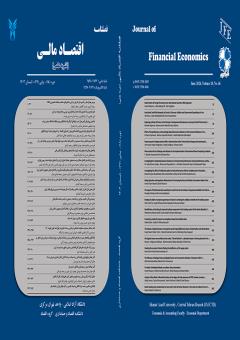Presenting a model to improve tax compliance based on foundation data
Subject Areas : Financial Economics
mahdi khadri
1
![]() ,
Habib Piri
2
,
Reza sotudeh
3
,
Habib Piri
2
,
Reza sotudeh
3
1 - PhD student in Accounting, Islamic Azad University, Zahedan, Iran.
2 - Assistant Professor, Department of Accounting, Islamic Azad University, Zahedan, Iran.
3 - Assistant Professor, Department of Accounting, Islamic Azad University, Nikshahr, Iran.
Keywords: taxation, Tax compliance, Accounting Standards, diagnostic taxable income,
Abstract :
In terms of the basic practical purpose, in terms of nature, survey research and in terms of paradigm, combined-exploratory research, sampling in the qualitative part of the research was done in a purposeful way and in the quantitative part in a stratified random manner. . In the qualitative phase, the interviews with 15 people, academic and tax experts who have at least a master's degree or have been working in the tax field for 15 years, continued until theoretical saturation was reached, and the samples of the quantitative part were based on Cochran's formula was chosen. The research tool in the qualitative part was a semi-structured exploratory interview, and in the quantitative part, a researcher-made questionnaire was used to evaluate the improvement of tax compliance, which was designed based on the codes obtained in the qualitative stage. In the qualitative part, the interviews were analyzed using the foundation's data analysis method. The validity and reliability of the components were examined and the Cronbach's alpha of all the above components was 0.7 and during that; The most important components of improving tax compliance were measured. In the quantitative part, the accuracy of the research model was confirmed through the method of structural equations using Amos software, and it was found that the selection of concepts, dimensions and indicators was of high accuracy and could provide a suitable framework for the preparation of the document. provide the prospect of improving tax compliance.
فهرست منابع
افضل نیا، سیدحسن(1398) بررسی تاثیر انطباق مالیات ابرازی و مالیات تشخیصی بر فرصت رشد شرکتهای پذیرفته شده در بورس اوراق بهادار تهران، چشم انداز حسابداری و مدیریت، دوره دوم، شماره 11، صص18-29.
خانی، عبدالله، ایمانی، کریم، ملایی، بهنام(1393)، بررسی رابطۀ بین تخصص و اجتناب مالیاتی شرکت های پذیرفته شده در بورس اوراق بهادار تهران، دانش حسابرسی، 13(51)، 33-68.
خواجوي، شكراله؛ ابراهيمي، مهرداد(1396) بررسي تأثير متغيرهاي حسابرسي بر احتمال وقوع تقلب در صورتهاي مالي: شواهدي از شركتهاي پذيرفته شده در بورس اوراق بهادار تهران- نشريه دانش حسابرسي. جلد ۱۷ شماره ۶۸ صفحات ۴۱-۶۲.
رضايي، فرزين، جعفري نياركي، روح الله(1394). رابطه بين اجتناب مالياتي و تقلب در حسابداري شركتها، 23(26)، 109-134.
سعیدی، هادی و غلامی نژاد، زهره،1397،انطباق مالیات دفتری و مدیریت سود در واکنش به کاهش نرخ مالیات در شرکت های پذیرفته شده در بورس اوراق بهادار تهران،کنفرانس ملی مطالعات نوین اقتصاد، مدیریت و حسابداری در ایران،کرج
صبوری اشکذری، علیرضا و حاجی قاسمی، محمدرضا و دهقانی اشکذری، منصور،1399،بررسی تاثیر تفاوت مالیات ابرازی و قطعی بر کیفیت سود در شرکت های پذیرفته شده در بورس اوراق بهادار تهران،چهارمین کنفرانس ملی پژوهش در حسابداری و مدیریت،تهران
صحرایی، ندا(1394) بررسی رابطه بین انطباق مالیات دفتری و مدیریت سود، پایان نامه کارشناسی ارشد، موسسه آموزش عالی پرندک
فلاحی، محمد و علیپور، صفدر،1397،بررسی تاثیر حسابرسی مالیاتی بررابطه بین مالیات ابرازی، تشخیصی قطعی (مطالعه موردی: استان های اصفهان یزد)،کنفرانس ملی رهیافت های نوین در مدیریت، اقتصاد و حسابداری،تهران
عباس زاده, محمدرضا, فدایی, مرتضی, مفتونیان, محسن, بابایی کلاریجانی, مائده. (1395). بررسی ارتباط شفافیت مالی و اجتناب مالیاتی با توجه به مالکیت نهادی شرکتها ( مطالعه موردی شرکتهای بورس اوراق بهادار تهران ). اقتصاد مالی, 10(35), 45-74.
کامیاب تیموری، رضا، کیقبادی، امیررضا، فرساد امان الهی، غلامرضا. (1400). شناسایی ریسکهای قابل کنترل عدم تمکین مالیاتی با رویکرد مدل سازی معادلات ساختاری. اقتصاد مالی, 15(56), 269-302.
گرد، عزیز و کشاورز، الهام،1396، انطباق مالیات دفتری و مدیریت درآمد در پاسخ به کاهش نرخ مالیات، رویکردهای پژوهشی نوین در مدیریت حسابداری، شماره 3، صص109-116.
محبوبی، جواد(1395) بررسی کیفیت مالیات ابرازی عملکرد و ارزش افزوده اشخاص حقیقی و مالیات تشخیصی و قطعی، پایان نامه کارشناسی ارشد، دانشگاه فردوسی مشهد.
ملااسمعیلی دهشیری، حسن، پژویان، جمشید، غفاری، فرهاد، حسینی، سید شمس الدین. (1401). تحلیل اثر سیاست مالی (مالیات بر مجموع درآمد) بر توزیع درآمد کشورهای منتخب OECD. اقتصاد مالی, 16(58), 93-108.
ملکیان, اسفندیار, فرزاد, سروه. (1396). تأثیر حسابرسی مالیاتی بررابطه بین مالیات ابرازی، تشخیصی و قطعی: مطالعه موردی استانهای آذربایجان شرقی، غربی و شرق و جنوب تهران. پژوهش های حسابداری مالی و حسابرسی، دوره 9، شماره 33، صص51-64.
ناصری، محمد و محمدزاده سالطه، حیدر،1394،بررسی تأثیر ویژگی های مالی بر اختلاف مالیات ابرازی و قطعی شرکت های پذیرفته شده در بورس بهادار ایران،سومین کنفرانس بین المللی حسابداری و مدیریت،تهران
نجاتی، بهروز و فرید، داریوش،1395،اختلاف مالیات ابرازی، قطعی و تشخیصی اشخاص حقوقی،پنجمین کنفرانس بین المللی حسابداری و مدیریت با رویکرد علوم پژوهشی نوین،تهران
Desai, M. A. and D. Dharmapala, 2009. “Corporate Tax Avoidance and Firm Value” in The Review of Economics and Statistics 91(3): 537-546.
Frank, M. M., Lynch, L. J., & Rego, S. O., (2009), Tax Reporting Aggressive Ness and its Relation to Agressive Financial Reporting. The Accounting Review, 84(2), 467-496.
Hanlon, M. (2015). “What can we infer about a firm’s taxable income from its financial statements?”. National Tax Journal, 56 (4): 831–863.
Hanlon, M., and S. Heitzman. (2010). "A review of tax research." Journal of Accounting and Economics, 50 (2-3): 127–178.
Noor, R.M., Mastuki, N.A., Bardai, B. (2009), “Book-Tax Difference and Value Relevance of Taxable Income:
Pazarçeviren, Selim Yüksel.(2015), "Adli Muhasebecilik Mesleği", Zonguldak Karaelmas Üniversitesi Sosyal Bilimler Dergisi, Cilt. 1, Sayı.2, s.1-19
Phillips, J. )2003(. “Corporate tax-planning effectiveness: the role of compensation- based incentives”. The Accounting Review, 78, 847–874.
Shackelford, D., J. Slemrod, and J. Sallee, 2011. “Financial Reporting, Tax, and Real Decisions: Toward a Unifying Framework,” International Tax and Public Finance, 18(4), 461-494.
Sonnier, B.M., Hennig, C.J., Everett, J.O., Raabe, W.A. (2012), “Reporting of book-tax differences for financial and tax purposes: A case study”, Journal of Accounting Education, 30, 58–79.
Wilson, R., (2009). “An examination of corporate tax shelter participants”. The Accounting Review, 84, 969–999.


